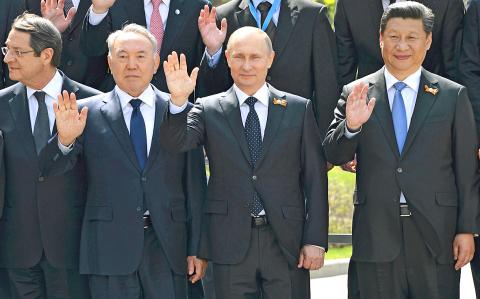China has invited Russian troops to march in a parade in Beijing in September to commemorate the end of World War II, the Chinese Ministry of Defense said yesterday, a move likely to further put off Western leaders from attending.
China has been coy about which nations it plans to invite to the parade, but said it would likely invite representatives from the Western allies who fought with China during the war.
However, Chinese President Xi Jinping (習近平) could be left standing with few top Western officials due to Western governments concerns over a range of issues, including the expected presence of Russian President Vladimir Putin, diplomats said.

Photo: Reuters
Xi on Saturday attended a parade in Moscow to mark 70 years since the end of the war in Europe.
A Chinese Ministry of Defense statement said that Chinese Central Military Commission deputy chairman Fan Changlong (范長龍) told Russian Minister of Defense Sergei Shoigu that China “warmly welcomes Russian military leaders and army formations” to take part in the September events in Beijing.
Xi’s visit to Russia and appearance at the Moscow commemorations “pushed the China-Russia all-round strategic partnership relationship to a new level,” Fan added, according to the statement.
Western leaders boycotted the Moscow parade over Russia’s role in the Ukraine crisis.
The Beijing parade, which is likely see troops marching through Tiananmen Square, is to be Xi’s first since he took over as Chinese Communist Party leader and military chief in late 2012 and as state president in early 2013.
Sino-Japan relations have long been poisoned by what China sees as Japan’s failure to atone for its occupation of parts of the nation before and during the war, and Beijing rarely misses an opportunity to remind its people and the world of this.
Last month, US President Barack Obama’s top Asia adviser, Evan Medeiros, said that he had questions about whether a large military parade would really send a signal of reconciliation or promote healing, drawing a rebuke from China.

MORE VISITORS: The Tourism Administration said that it is seeing positive prospects in its efforts to expand the tourism market in North America and Europe Taiwan has been ranked as the cheapest place in the world to travel to this year, based on a list recommended by NerdWallet. The San Francisco-based personal finance company said that Taiwan topped the list of 16 nations it chose for budget travelers because US tourists do not need visas and travelers can easily have a good meal for less than US$10. A bus ride in Taipei costs just under US$0.50, while subway rides start at US$0.60, the firm said, adding that public transportation in Taiwan is easy to navigate. The firm also called Taiwan a “food lover’s paradise,” citing inexpensive breakfast stalls

US PUBLICATION: The results indicated a change in attitude after a 2023 survey showed 55 percent supported full-scale war to achieve unification, the report said More than half of Chinese were against the use of force to unify with Taiwan under any circumstances, a survey conducted by the Atlanta, Georgia-based Carter Center and Emory University found. The survey results, which were released on Wednesday in a report titled “Sovereignty, Security, & US-China Relations: Chinese Public Opinion,” showed that 55.1 percent of respondents agreed or somewhat agreed that “the Taiwan problem should not be resolved using force under any circumstances,” while 24.5 percent “strongly” or “somewhat” disagreed with the statement. The results indicated a change in attitude after a survey published in “Assessing Public Support for (Non)Peaceful Unification

PLUGGING HOLES: The amendments would bring the legislation in line with systems found in other countries such as Japan and the US, Legislator Chen Kuan-ting said Democratic Progressive Party (DPP) Legislator Chen Kuan-ting (陳冠廷) has proposed amending national security legislation amid a spate of espionage cases. Potential gaps in security vetting procedures for personnel with access to sensitive information prompted him to propose the amendments, which would introduce changes to Article 14 of the Classified National Security Information Protection Act (國家機密保護法), Chen said yesterday. The proposal, which aims to enhance interagency vetting procedures and reduce the risk of classified information leaks, would establish a comprehensive security clearance system in Taiwan, he said. The amendment would require character and loyalty checks for civil servants and intelligence personnel prior to

The China Coast Guard has seized control of a disputed reef near a major Philippine military outpost in the South China Sea, Beijing’s state media said, adding to longstanding territorial tensions with Manila. Beijing claims sovereignty over almost all of the South China Sea and has waved away competing assertions from other countries as well as an international ruling that its position has no legal basis. China and the Philippines have engaged in months of confrontations in the contested waters, and Manila is taking part in sweeping joint military drills with the US which Beijing has slammed as destabilizing. The Chinese coast guard